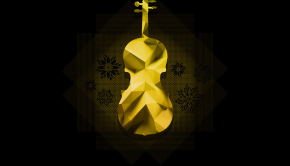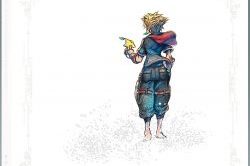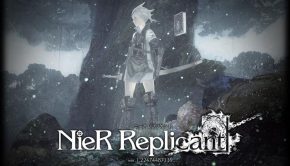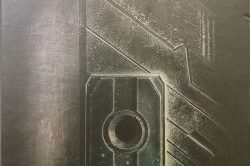Kingdom Hearts Original Soundtrack Complete
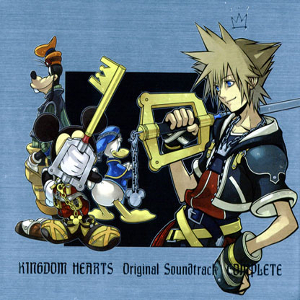 |
Album Title: Kingdom Hearts Original Soundtrack Complete |
| Record Label: Square Enix |
|
| Catalog No.: TOCT-26221/9 |
|
| Release Date: March 28, 2007 |
|
| Purchase: Buy at CDJapan |
Overview
Around the time Kingdom Hearts II: Final Mix+ was released in 2007, Square-Enix saw fit to release the Kingdom Hearts Original Soundtrack Complete. A nine-disc, 229 track compilation of the scores of the first three games, this album was, and to an extent remains, a thorough collection of the series’ music. I say to an extent because obviously, the three games represented here are no longer the only ones in the franchise; for a more current, overarching Kingdom Hearts soundtrack, see the Kingdom Hearts 10th Anniversary Fan Selection -Melodies & Memories- album. It’s also worthwhile to consider the hefty pricetag of this album, which might make other, more recent options more attractive.
That being the case, however, this box set is still a gem, boasting a number of strong pieces from Yoko Shimomura, the series’ primary composer, many of which still hold up today despite being arranged for the Playstation 2. The first two discs contain tracks from the first game, while discs three to six cover the material of Kingdom Hearts II. Discs seven and eight contain tracks from Kingdom Hearts Re:Chain of Memories, while the final disc introduces bonus tracks from the Final Mix versions of the former two titles. And really, with 229 tracks to choose from, there’s a little something for everyone…
Kingdom Hearts
…Like the first four tracks on disc one, which contain three of the series’ primary musical cues. The always harmonious “Dearly Beloved” is one. “Hikari -KINGDOM Orchestra Instrumental Version-” and “Hikari -PLANITb Remix- (Short Edit)” carry the Hikari theme (better known to international audiences perhaps as Simple and Clean), the latter of which is a catchy dance remix with Utada Hikaru’s smooth vocal stylings. Last but not least, the Destati motif debuts in “Dive into the Heart -Destati-”, one of the best tracks from the first game. The use of ethereal choir and low, almost pulsing monotone piano bass creates the brooding, mysterious atmosphere that sets in motion Sora’s journey. A tempo shift around 2:15 changes things up, the bass pounding with more urgency as strings glide along in increasing frenzy. At 3:42, the pace stills once more, and a change in key describes a safe, if uncertain, denouement.
Moving on from this initial group, the rest of Kingdom Hearts awaits. As is generally the case for scores in this series, most of the tracks are area themes and their corresponding battle themes. There are quite a few standouts, from the tropical vibes of “Destiny Island” to the moody piano passages in “Night of Fate.” Other highlights include “Traverse Town” with its mellow alto sax melody, its respective battle tun “Hand in Hand,” which exudes a bounding sense of being on an adventure, and the playful flute/xylophone/string trio that characterizes “Welcome to Wonderland.” “Deep Jungle” feels suitably adventurous with its pan flute, buttressed by tribal, rhythmic percussion, as does the aptly named “Having a Wild Time,” which picks up the pace and makes with it like an ape swinging through the trees “Winnie the Pooh” sounds appropriately folksy and pastoral, without veering into an overly saccharine field. The tracks for Aladdin’s world, “A Day in Agrabah” and “Arabian Dream”, go for a Middle-eastern flair with some maqam hijaz and evocative sitar samples.
The belly of Pinnochio’s leviathan, Monstro, brings us “A Very Small Wish,” a staccato waltz I find a bit underrated. And, if you ever wanted to hear truncated, instrumental versions of “Under the Sea” and “This is Halloween,” you’re in luck. The synth does hold them back slightly, but they’re still decent representations. Once in Neverland, the battle theme “Pirate’s Gigue” proves a fun, sea shanty-ish ditty, swaying back and forth along tuned percussion, woodwind and strings. “Neverland Sky,” meanwhile lifts off and soars majestically with those long, graceful string glides that might bring to mind a Super Mario Galaxy.
There are some disappointments here and there, as in anything: “Olympus Coliseum” is loud, pompous and more repetitive than most; not the most rewarding independent listen. The same goes for its corresponding battle theme, “Road to a Hero.” Aside from that, there are occasionally some standard if unspectacular filler tracks, some of them exceedingly brief—such as “Turning the Key,” at 16 seconds, and the music box tune “Once Upon a Time,” at 21. The music for the oft-derided Gummi ship portions of the game, moreover, specifically the three main “Blast Away! -Gummi Ship II-” tracks, while serviceably adventurous, sound pretty linear and redundant. That said, the third, which plays as Sora’s ship pierces deeper into the dark void where the stars cease to shine, takes on a fitting, ominous martial tone which helps distinguish it from the other two.
Far and away the best of area and battle themes alike, however, must belong to the penultimate world, “Hollow Bastion”. With a potent air of mystery, its 5/4 beat, its harmony of hurried strings and grand vocals and organ all create an unusual duality of tension and serenity. This world put you in uncharted (often gravity-defying) waters, and you can feel in the music the dramatic escalation as Sora and friends near the climactic finale of their journey. Heartless belched from the darkness bring forth the brutally percussed “Scherzo di Notte,” the trick of the night, low-register piano bolstering a 6/8 time, bouncing, acclivous, five-note flourishes of strings, winds, and slower, lighter piano. It’s fantastic. But, there is still one level after this one, with its own area themes of note. “End of the World” is basically the first act of “Dive into the Heart” refurbished, while “Fragments of Sorrow” takes cue from a part of “Destati,” (a track appearing later in the album), chorus howling out sorrowfully as Sora and his friends wander through the pallid desolation.
Interspersed with all these melodies, other more miscellaneous tracks accompany the heroes on their fight to save the worlds from darkness and find their friends. To one such friend, Kairi, belongs the only character motif of the first game—and three versions, at that. The first one is my favorite, the alternating flute and piano playing like two childhood friends, fitting for the significant character of Kairi and the role she plays. “Treasured Memories” likewise paints a sweet sort of melancholy. All this airy gentility is sharply contrasted by both “Strange Whispers” and “Villains of a Sort,” darkly ambient themes plied across menacing strings for the game’s foes that work better in game than as standalones. And “Friends in my Heart” provides an arrangement of the Dearly Beloved melody, echoed and gloriously embellished with chorus later on in “Always on My Mind.”
Now, personally, some of the music I most anticipate with each new game, are the boss battle themes, and Kingdom Hearts began that great tradition right here. Kicking things off, “Destiny’s Force” is an, for lack of a better word, epic piece; sweeping strings and thundering brass portray the grandeur and enormity of the monstrous Heartless Sora now confronts. “The Deep End,” used for such bosses as Maleficent’s dragon form, Hercules’ Ice Titan, and the Darkside Heartless, forgoes the previous track’s slow, measured approach in favor of dynamic action, an ascending nine note intro leading into a strong brass rhythm and severe string progression. Both tracks perfectly impress the dangerous power of the game’s colossi.
Yet these stand as pale shadow next to another pair of boss themes. One of my favorite of the series, “Forze del Male” is played for Sora’s final showdowns with his best friend turned enemy, and the malevolent Ansem who possesses him. Raw power blitzes you from the outset—pounding bass and haunting organ driving in relentless assault, while some flittering flute and piano phrases add an elegance to the track. The rising piano run around 1:20 is especially stunning, one of Shimomura’s finest. In similar fashion, “Guardando nel Buio” sets the stage for the final fight against Ansem and his World of Chaos, blending choral passages from Destati with high strings sections. As with Forze, the piano riffs are a nice decoration.
“Beyond the Door” seals Ansem’s fate, an ominous organ giving way to brilliant choir and bells ringing out, as the villain is annihilated in a burst of light. As the ending cutscenes commence, “Always on My Mind” demurely begins, another recurring leitmotif used in the series. Piano and flute carry the harmony, with trimmings of harp and bells, before the organ and choir stir to life. The piece swells poignantly, then lulling to a close, leaving the bells to chime sadly alone, conveying the bittersweet conclusion of the tale, as Sora must bid farewell to those he loves, with only the hope of a reunion someday. The original “Hikari” song follows. Better known to international audiences, perhaps, as “Simple and Clean,” this song is an overarching anthem to the series. It’s gentle, it’s catchy, and it features Utada’s strong melodic vocals. And then there’s “March Caprice for Piano and Orchestra,” this game’s wonderful credits music. Here, Kaoru Wada arranges “Always on My Mind” into a grand procession for the Tokyo Philharmonic, a staple of his work in the series, before arriving at the titular March theme. A few bonus tracks populate the end of the second disc, including the chorally haunting “Destati,” the original work from which all other interpretations are derived.
Kingdom Hearts II
Disc 3 brings us to Kingdom Hearts II, which boasts the largest track selection of the three games included. Whereas the Kingdom Hearts II Original Soundtrack was compressed to just two discs, the music breathes across four full discs in this box set. And as with its predecessor, Kingdom Hearts II opens with its own gorgeous rendition of “Dearly Beloved,” here much more developed and thoroughly explored than the first one, along with a new song from Utada Hikaru. Both “Passion ~opening version~” and “Passion -KINGDOM Orchestra Instrumental Version” follow in the footsteps of “Hikari,” with the original J-Pop song being composed by Utada, and Wada once again handling the stirring orchestral treatment. And, as with that previous theme, “Passion” serves as an overarching motif for its respective game, fittingly darker and deeper than its predecessor.
The introductory pieces behind us, Sora awakens from his sleep to usher in the bulk of this section: Once more, that means area and battle themes. This time, however, duplicates abound and the repeated tracks are either almost identical to their previous incarnations or inferior if for no other reason than lower synth quality. (Kingdom Hearts II employed a different synth operator than its predecessor). “Reviving Hollow Bastion” and “Scherzo Di Notte,” with its grating violin, are among the most unfortunate victims, as are the revisited “Dive Into the Heart -Destati-” and “Fragments of Sorrow,” which struggle to recreate the original mystical air with their subpar synth. The most damning, however, is the rendering Klaus Badelt’s “He’s a Pirate” from the Pirates of the Caribbean franchise. From epic orchestra to a sequenced sound that felt archaic by the game’s 2005 release, this interpretation is a let down.
This is not to say that other tracks, particularly new entries, did not fare better. “Lazy Afternoons” is the first theme for Twilight Town, the home of new character Roxas and his school friends. The boy’s life and relationships are reflected well in this melancholy melody of flute and strings. “The Afternoon Streets” and “Working Together”—both the second set of themes for Twilight Town—evoke a strong contrast to the first’s melancholy through their warm melodies and upbeat rhythms. Others also shine, like “The Home of Dragons” and “Fields of Honor,” the themes for Mulan’s world, which use a koto to provide a cultural flair. “Monochrome Dreams,” the theme for the throwback Steamboat Willie stage, possesses a playful, Disney-esque bounciness in its flautal melody, accompanied most notably by marimba and some grunting brass in the background. Likewise with the battle theme, “Old Friends, Old Rivals,” which kicks the old-timey timbre into a rumble-tumble high gear.
Agrabah is among the returning worlds I mentioned, but this version of “Arabian Dream” manages to surpass its Kingdom Hearts counterpart, switching up the key and just generally sounding more vivacious. “Adventures in the Savannah” marks the appearance of The Lion King in the series with some Sarengetti zest from the very start, didgeridoo establishing the ethnic tone and leading to a beat of African drums, melody of horn and flute, with dashes of kalimba riffs thrown in for extra flavor. Horns take a more prominent role in “Savannah Pride,” humming and building in layers in the background to create a more tense, dangerous feeling. Things get really electronic and cyberpunkish once we arrive in the world based on Disney’s quirky Tron, with “Space Paranoids” playing with a futuristic, bizarrely alien dissonance and synth melody.
The Atlantica section of this game is unique. It has its area theme, sure: “Isn’t It Lovely?”, a peaceful, aquatic sounding piece. The majority of the tracks, however, are songs, for the music minigame portion of the game. It might be a bit strange to hear familiar tunes like “Under the Sea” and “Part of Your World” sung by the characters’ Japanese voice actors, but they do a serviceable job capturing that Disney magic (although not all of the songs, namely the original compositions, are quite as good). And at last, arriving at the final world, “Sacred Moon,” while perhaps less atmospheric than the old “End of the World,” creates an ethereal and unnerving mood through its chilling vocal and harp samples, off-kilter percussion, and a high-arcing piano section in the middle (the piano returns as the highlight of the battle theme, “Deep Drive,” to provide a slightly more stable melody amidst a chaotic rhythm).
The Gummi ship returns, as well, and in comparison to the first game, the music here crosses a broader range of genres. Unfortunately, not much stands out, with some of the tracks again being brief filler of around half a minute, like “Blast Off!” “Hazardous Highway” is perhaps the best of the lot, using a rock style with electric guitar that makes it unusual among all Kingdom Hearts music, really. As for character themes, this time Kairi is not alone in boasting one. There’s “Sora,” which is overly bold and bombastic; “Roxas,” whose descending forlorn flautal phrases are just the opposite; and “Riku,” which falls somewhere in between, a contemplative piece that reflects the character’s wavering on the boundary of light and dark.
There are many more boss tracks this time, as well! “Tension Rising” is an exciting, if brief track, for frantic strings and racing xylophone runs beneath. “Desire for All That Is Lost” is short, but one of my favorites, thanks solely to the gorgeous piano solo in the second half. “Vim and Vigor” is as energetic as its title suggests, if on the brief side, with surprisingly decent sounding synth strings that lend these boss fights an extra cinematic feel. “Rowdy Rumble” is the theme for Mickey’s arch-rival, Pete, and fittingly for the character has a bouncy, almost playful marimba rhythm to go with its melody, which soon erupts in a dynamic symphonic menace. Other Disney boss fights allow us to sample “The Encounter,” which takes the opposite tack and goes for an all-out, overarching grandeur with its full range of strings, organ, vocals and more, stepping in steady progression, while a primal percussive rhythm rolls on at the heart.
However, the true antagonists of the game soon raise their hooded heads, and with the initiates of Organization XIII arrives a host of new boss tracks. There’s “The 13th Struggle,” the original battle theme for select members of Organization XIII, which lets its organ and violin melody create a wild atmosphere for fighting these mysterious black-cloaked figures. As Sora and friends journey through the worlds, and the conflict rises, the music takes a more dramatic turn with “The 13th Dilemma,” where sweeping string chords, cold chants and piano notes dance over a nervous, hurried rhythm in an arrangement of the Another Side motif, particular to this series’ enigmatic race of non-existent beings.
The group’s leader, Xemnas, has three themes of his own, constituting a strong collection of final battle music. The darkly atmospheric “Disappeared” impresses with its tense, mounting intro heavy with jittery half steps. The choir lends a sense of the mystery and power of this enigmatic man as it chants over a three chord progression of strings, building to a climactic outburst. “A Fight to the Death,” building on this sense of mystery, nonetheless aims at depicting a more menacing force, with a heavy brass rhythm and ominously low strings, from which bursts the piano in hasty runs, and, later, a reprisal of “Dearly Beloved” set against falling string patterns. All these battles, however, merely prelude the final, epic showdown, Xemnas unleashing the totality of his void-based strength to the three-part tune of “Darkness of the Unknown.” The first section, calm and steady, only hints at the enemy’s power. The second kicks into high-gear, giving a full, menacing body to the skeleton introduced before. The final movement is the true gem, as the tempo is reigned in, and the vocals and strings glide along in a solemn dirge before steadily mounting to a passionate apogee. This finale is a stunning contrast to the usual final battle fare, which are typically fast-paced and action-pumped.
“Passion (After the Battle)” is a nice, quiet, reflective reprise of that song that covers the credits. Well, the first part of the credits. As for the second… If I hadn’t treated “Fantasia alla marcia for piano, chorus, and orchestra” before, I would blanch now at the thought of tackling such an awesome, monumental track with a tool as meager and unrevealing as words. Let’s just say, calling this beautiful thematic compilation a highlight of the album would be understating it.
Following that which I would not blame Shimomura or Wada should they choose to call it their magnum opus, several more Wada-orchestrated tracks bring this game to a more humble close. The “Destiny Islands” theme gets a lovely, gentle reprise, this time with live guitar and airy flute to evoke that serene, tropical setting that welcomes Sora home; it’s a far more effective rendition of the theme than the original back on Disc 1. “Hand in Hand” receives a short orchestral arrangement, this time with a coda of “Dearly Beloved” trailing off at the end in a manner both resolute and mysterious. Fittingly so, since ‘mysterious’ is the top descriptor for “Sunset Horizons,” whose blend of uncharacteristically low strings, thunderous yet rhythmic timpani, and deep brass sounds more ominous than any note ever uttered in Kingdom Hearts; the transition to soft piano and an eerie solo violin is even more effective, and a portent of shadowy events to come (as well as an increased use of violin in subsequent Kingdom Hearts games, but that is another story).
Kingdom Hearts Re:Chain of Memories
Fortunately for me, the next game, Re:Chain of Memories, covered by discs 7 and 8, doesn’t have quite so many tracks to write about. Most of the music in this entry, particularly the area and battle themes that have taken up a bulk of the other discs, are reused, since this midquel reused many of the worlds from the original game. So, aside from some very minor alterations in timbre, some instrumentation, etc., they are the same.
This is not to say there aren’t a few new treats. Opening up this new adventure is “Memories in Pieces,” a short compository track that opens with a more pensive reading of the usually upbeat “Hand in Hand” theme, before introducing several others prominent throughout the game. A wonderfully dark, brooding rendition of the normally melancholy “Scent of Silence” sets the tone next, hinting that not all is well at the moonlit crossroads before Sora, and reeking of sinister purpose. In contrast, the gentle “Namine” theme is here a gentle piano melody of wavering mood, some rolled chord figurations, and accompanied by clarinet, rather than its usual arpeggiated harp. The brief but rich track ends with a snippet of the “Castle Oblivion” theme, with harp scales, deep bass chorals and haunting strings beckoning the heroes to the mysterious, white-halled castle that stands before them.
Apart from that, there is some other good material here. “Thirteenth Discretion” serves as the villains’ theme, and, while brief, contrasts its low and high strings to create a very unsettling atmosphere. There’s another version of “The 13th Struggle,” too, which is basically the same but lacks the interlude of the other. I actually consider this one to have better instrument samples, but that’s me. “Forgotten Challenge” is the fight theme of the last area, and builds upon what “Castle Oblivion” began, dynamic organ runs and pounding percussion telling of the power of the dangerous foes that now ambush the party, while choir and violin sing out mournfully, and trail off without resolution. The last trio of final boss tracks stand as worthy entries among their predecessors and successors.
“Graceful Assassin” is well worth a listen, a swaying, waltzy piece for strings and piano, with a dash of organ to portray the elegance of the eponymous assassin, Marluxia, powerful member of Organization XIII and lord of Castle Oblivion. Building to its climax, the “Another Side” theme sings out, the theme’s first appearance in an actual in-game track after its initial debut in Kingdom Hearts: Final Mix. “Scythe of Petals” begins as the battle heats up, with a brutal percussive beat supporting some glissando violin samples, as well as the usual chorals and organ. Intense harp scales, rising and falling, add a fullness to the blend. But nothing tops “Lord of the Castle,” a dramatic conclusion to the tale, which concludes with a soaring climax of strings that closes out the melody.
Kingdom Hearts: Final Mix / Kingdom Hearts II: Final Mix
Disc 9 rounds out the collection, with a small sampling of tracks from the Final Mix versions of the two numbered titles. Most are actually really solid pieces. “One-Winged Angel” is an abridged version of the Final Fantasy VII classic, incorporated into this game’s showdown against the super soldier Sephiroth. “A Night on the Bare Mountain” is likewise an abridged version of Mussorgsky’s masterpiece, and the synth here really pales in comparison to actual orchestration.
Among the other two Kingdom Hearts: Final Mix tracks, “Disappeared” also appears in its original incarnation on this disc. In contrast to its KH2 appearance, it puts greater emphasis on its string work than the chanting choir, the latter relegated to the background this time. “Another Side” is another major piece in the series—whose bits and motifs other tracks in Kingdom Hearts II and onward sample and borrow for themselves. Here is its debut form. And though you will hear some of these other interpretations later in this album, the original is the best, especially the section at 1:25, where the excited rhythm pauses as brass and strings crescendo, the music’s energy leaping and diving and then again until a quiet piano and vocal coda close the track on a deeply mysterious note. All in all, a perfect theme to end this first journey and transition to the next.
Another Organization battle theme appears here, exclusive to Kingdom Hearts II: Final Mix, “The 13th Reflection”. It is my favorite of the bunch, due to the contrast between its frenetic rhythm and its slower, more graceful interplay of synth strings and piano. “Cavern of Remembrance” and “Deep Anxiety,” meanwhile, are the respective field and battle themes for a bonus stage in the game, accessed via Radiant Garden. The former is pretty simple, a single, mellow tone humming out as a quirky synth beat, gliding strings, and brief piano phrases (which, intentionally or not, echo the progression of certain phrases of Kairi and Xion’s themes) that together, create an air of peaceful reflection, appropriate to the cavern’s name; the latter kicks it up a notch, and yet is much in the same vein.
An arrangement of Roxas’ theme, “The Other Promise” plays during Sora’s showdown with his Nobody—it’s a serviceable piece, but once you hear the orchestrated Drammatica version, no other will suffice. The final two tracks on the disc—and the album—are, like “Sunset Horizons,” omens of what follows Kingdom Hearts II. “Rage Awakened” is a dynamic boss theme for the silent, stalwart, crazy strong Lingering Will, featuring intense synth bass ostinato and light organ, with solo violin gliding smoothly along. Personally I don’t feel it surpasses the other optional boss themes on this disc. Last but certainly not least, we get one more Wada arrangement in the form of “Fate of the Unknown,” a bridge to the next game, similar to “Another Side’s” role. Chorals suggest ominous mystery; strings and brass depict a frantic, whirlwind struggle; a sorrowful, slow dirge for piano and strings, and a glorious finish brings it home. As an aside, this track also introduces a couple of motifs that, while not relevant to this album, become so in later entries.
Summary
And so this behemoth compilation album ends on a strong note (seriously, that piano though). I have definitely not covered everything in this review, omitting mention of numerous tracks as I sought to parse through the material. Stuffed with 229 tracks, the Kingdom Hearts Original Soundtrack Complete is a worthwhile purchase for any diehard fan, although several factors agai might make other of the series’ soundtracks more appealing. That said, if you’re looking to buy the complete musical corpus for the three games included here, there’s no better option. The work of the composer, synthesizer operators, and all involved in the process—their range and talent is on full display, from best to worst, and paints a broad picture of the earlier days of Kingdom Hearts’ world of music.
Do you agree with the review and score? Let us know in the comments below!
3.5
Posted on March 11, 2015 by Jon Weicher. Last modified on March 11, 2015.

